 |
 |
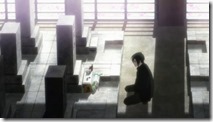 |
The two Production I.G. NoitaminA shows this season both delivered eminently predictable endings, but it’s illustrative of their natures that they chose such different ways of going about it.
As I look back on Psycho-Pass, my impressions of the series highlight two fundamental truths I see in Gen Urabuchi as a writer:
- While his talent and intellect enables him to ask quite interesting questions, it doesn’t seem to enable – or drive – him to try and offer any comprehensible answers.
- In terms of structure and characters, you can always count on Gen to be eminently predictable and to execute in a completely conventional way. Yet you can also count on him to execute the conventional very well.
As a result of the above, I’m always very conflicted about Gen and about his series. I would much rather watch a series by a writer who floats interesting ideas than one that doesn’t. I would much rather see shows that execute formula with enough skill to make it entertaining than ones that are too inept to do so. But for me Gen is the Emperor with no clothes. Gen shows always end up being a tease, empty calories, whatever metaphor you like – the experience, like the characters, ends up being somewhat hollow. It’s fitting, really, that Psycho-Pass ends with a shot-by-shot repeat of the opening episode – because Gen always ends up repeating himself, in a cycle that never ends.
I think there were exactly two characters in Psycho-Pass who ended up being really interesting, and both of them wound up dead. The first, Masaoka, was a standout not so much because he brought anything new to the table but because he, among all the representations of stock characters, had the most interesting story and the most compelling personality (and Arimoto Kinryuu’s great performance didn’t hurt). Masaoka, like all the characters in Psycho-Pass, had a role to play and played it to the hilt – he was the gruff but loveable veteran with the dark past, and he was flagged to die pretty much from the beginning. But as the living bridge between the pre and post-Sybil Tokyo, his role (within the series at least) was a singular one. He was also really the only character than spanned Kougami, Akane and Ginoza – the one whose arc intersected with all of them, and really the only one that all three had meaningful conversations with.
The other interesting character was of course Makishima, who was the closest thing to something really original in the cast. We’ve seen his type before of course but I think Makishima was an interesting case, and it’s a testament to Gen’s skill that Makishima made me feel so conflicted so often. Primarily I think it boils down to the fact that he was Gen’s mouthpiece inside the story, and thus was unsurprisingly given by far the most interesting things to say. Gen used Makishima to give voice to all the questions he was trying to raise in Psycho-Pass, but – and the irony is strong here – he abjectly failed in trying to find any answer to them. In the final analysis Makishima was all about calling attention to the problem and himself, but singularly ineffective at offering any real solutions. That’s about as meta as it gets if you really look at it closely.
Like all of Gen’s endings (though in F/Z there were certainly extenuating circumstances, given that it was a prequel to someone else’s story) Urobuchi-san tries to have it both ways and ends up embracing no answer at all. He’s set up Kougami, Akane and Makishima as the only three characters in P-P who really matter (unless you count Sibyl itself) each with a markedly different viewpoint on the events of the story. Gen is clearly sympathetic to Makishima’s complaints about the Japan of the Sibyl era, a thinly-veiled swipe at Japanese culture on the whole. Yet he ends the story with a bullet to the head, a seeming condemnation of the methods he chooses to pursue his goal. Kougami is a melding of the intellectual and the savage, a brutally violent man who quotes Pascal and convinces himself his vigilanteism is for a good cause. And then there’s Akane, who always tries to have it both ways, who wants to take the best of everyone and everything and always manages to walk about with a pristine psycho pass.
So who does Gen choose, in the final analysis? The irony here is this, as I see it: Makishima is the character Gen most identifies with, Kougami is the one he wishes he was, and Akane is the one he most closely resembles. Like Akane, Gen is fundamentally unable to break away from the establishment in the end. Like Akane, he’s always unable to make a choice (and a refusal to make a choice is a choice in itself). And as with Akane, we’re always left with endings that don’t feel satisfying. I appreciate that Gen is willing to share his internal conflict over the nature of the Japanese social contract and his agonizing over what justice truly is – but I wish he’d actually take a position and stand by it for a change. I may disagree with Makishima’s unforgivable methods in pursuit of what I see as ultimately a worthwhile cause, and I may disapprove of Kougami’s willingness to take the law into his own hands and declare himself the final arbiter of justice. But those, at least, are choices. What Akane does isn’t a choice – it’s just kicking the problem to the curb and waiting for someone else to come along and try to solve it. And that, for me, is a perfect model for what Gen does as a writer.
“The law doesn’t protect people; people protect the law.” When Akane utters a pompous line of pseudo-intellectual dialogue like that, I can’t help but wonder if Gen really buys it – and I think that’s a very important question. I can’t help but think that the reason Gen so frequently has his characters quote the words of great philosophers and writers is that he’s insecure of his ability to come up with meaningful words of his own. He’s wonderful at finding interesting ways of using the words of others, that can’t be denied – he’s like a great cover band, in that sense. He can recycle someone else’s material and package it in entertaining and interesting ways, but seems to lack that spark of creativity that would allow him to make a truly original statement. We’ve seen it in Madoka Magica, we saw it in Fate/Zero (which is undeniably better than the story it was originally based on, in my view) and we saw it again in Psycho-Pass.
What I can’t deny is that Psycho-Pass is a great series from a blogging standpoint. And the fact that it is makes me wonder if I’m being too hard on Gen here, because if it weren’t for his intellectual curiosity and technical skill that wouldn’t be the case – and indeed, it’s a fact that his shows are more interesting to write about than the vast majority of anime I cover (and never mind the ones I don’t). It’s a curious thing that the best moments for me in Gen series always seem to come when he does nothing but show two or three people sitting and talking to each other. The “conference of kings” moment from the first season of F/Z, the summits of Makishima and Senguji or Kougami and Saiga – or indeed some of the talks between father and son with Ginoza and Masaoka. These kinds of scenes seem to find Gen at his most secure as a writer, perhaps because he can use the various characters to toss his own conflicted ideas at each other and – and use their disagreement as a way of avoiding having to take a position himself. Viewed as a sort of extended psychoanalysis, Gen’s series take on a very interesting tone.
I also can’t deny that in writing up a summary of Psycho-Pass, I’ve spent most of the post talking about the writer – and that too is a testament to the fact that for all his faults Gen is one of the more interesting and significant ones in the anime business. The truth is that in terms of the rest of the production, there’s nothing nearly so interesting as Gen’s intellectual musings. Production I.G. has rarely displayed the kind of inconsistency they did in this series, it’s true – even apart from the legendary episode 18 fiasco (which prompted that most Japanese of reactions by the director, a public apology) the animation has been a bit of a roller-coaster ride. But in general P-P has been a good-looking, eye-catching take on the future noir genre. The cast is full of big names and uniformly fine (with Arimoto and Sakurai Takahiro’s performances being the ones that really stand out). Stylistically there’s really nothing new here – visually and narratively this is a well-constructed mashup of the likes of Blade Runner, Dark City and especially Minority Report. If it weren’t for Gen’s frustrating but interesting philosophical ruminations I think Psycho-Pass would have been eminently forgettable.
I’m not sure where I’d rank Psycho-Pass in terms of Gen’s recent catalogue. The first season of Fate/Zero was probably the best overall, though the second lost much of its mojo; Madoka Magica was the most ambitious but the most deeply flawed. In the end all of these shows tend to sort of blend together because of their generally 2-D characters, really more archetypes than individuals, and predictable plot progressions. There were a few moments when P-P seemed to come close to finding real profundity, only to fall short, yet it was very rarely less than entertaining and almost never truly uninteresting. I’ve been waiting through all these series for Gen to do something that truly surprises me, and I’m still waiting – but that I am still waiting might be the most important thing. He keeps me coming back, hoping that he really will surprise me the next time, and when he does that maybe that will be the moment when a Gen series finally makes the jump to true greatness.
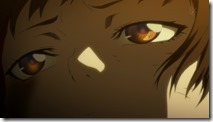 |
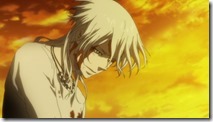 |
 |
 |
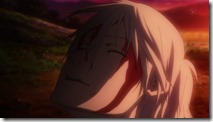 |
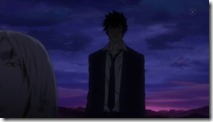 |
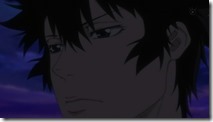 |
 |
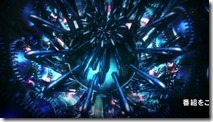 |
 |
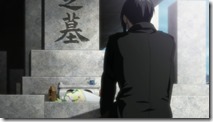 |
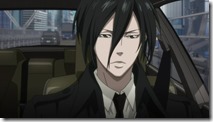 |
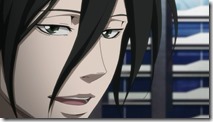 |
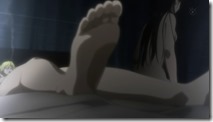 |
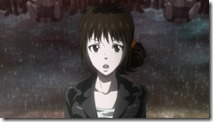 |
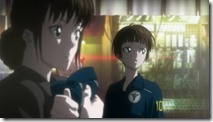 |
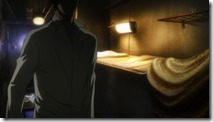 |
 |


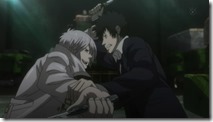
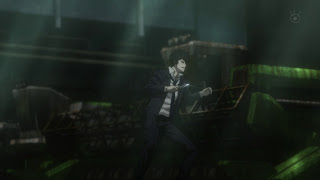
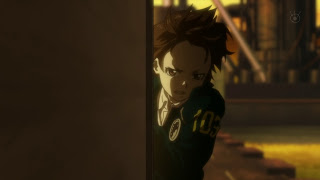

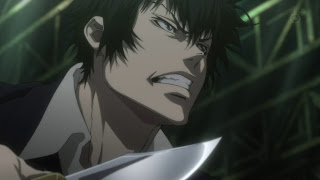
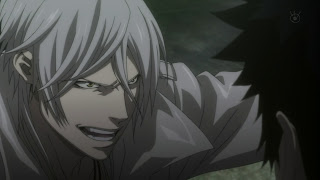
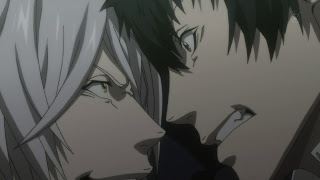
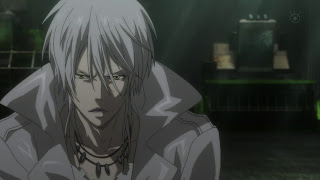
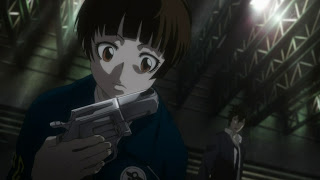
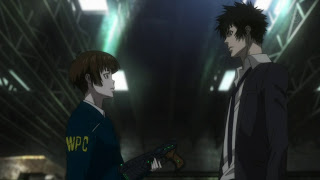
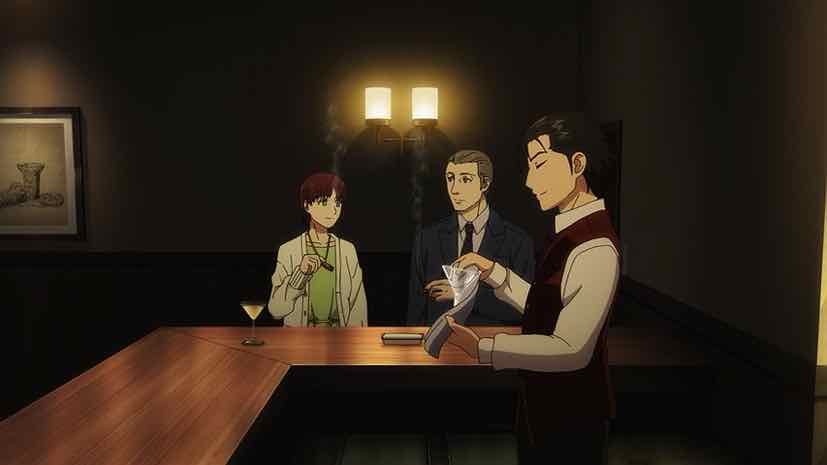
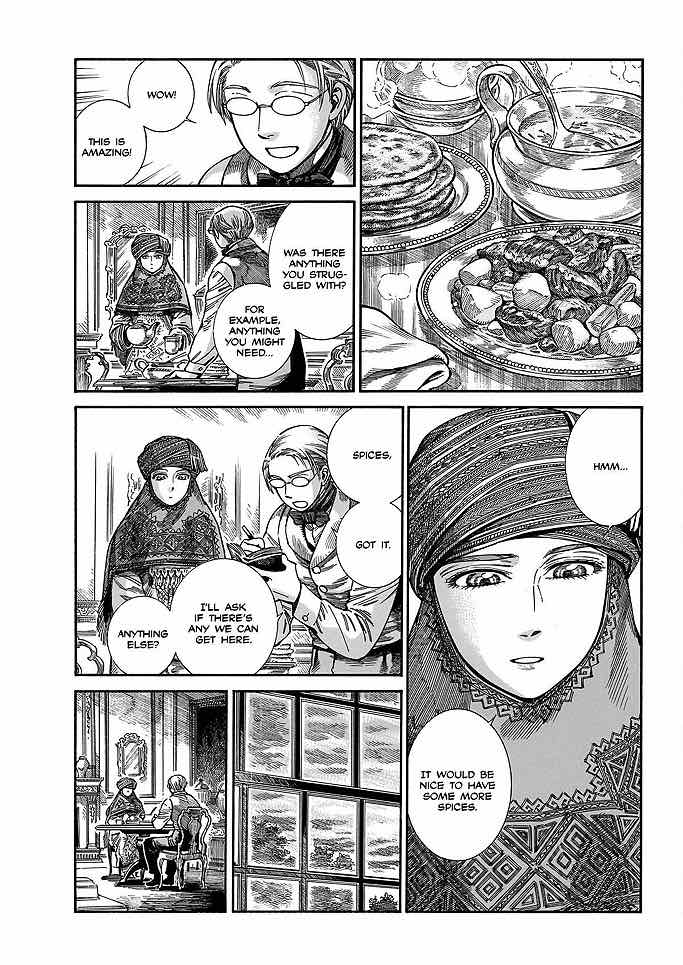
dirty water imp
March 23, 2013 at 6:47 amThe end was a series of misfortunes. The dark knight, who is always a character of singularity but little coherence, books safe passage to another land. Holden Caulfield finally dies near a field of grain; this was clearly his dream just like Rimbaud's — to sleep a drunken sleep on a beach. The prodigy, like many top prospects turns out not to be an ace, just a good workhorse who can eat innings.
I'm not really disappointed, PP was a series that sort of happened on the surface. Not much investment that way. Whatever floats by floats by and you watch.
Zeta Zero
March 23, 2013 at 7:56 amAkane's line "The law doesn't protect people, people protect the law" isn't so much psuedo-intellectual dialogue but rather Akane's thoughts about the law as it applies to (their) society's relationship with the SIBYL system. Furthermore one doesn't have to look far to see that many international trade and intellectual property laws are essentially being rewritten by the system stakeholders not to serve and protect the public good, but their own interests.
While the series does indeed have problems, I'm glad that a Science-Fiction series such as Psycho-Pass can exist among the more common high-school and moe drama that currently permeates the anime landscape. I would like to see what results other writers and directors come up with should they ever turn their hand to this.
Blueicegal ♥
March 23, 2013 at 8:44 amI am So sad to see it go. I'm hoping for a second season. I have a question: does anyone know why makshima spared akane. After firing the gun and finding it blank He says something along the line of "it's you" and walks off. Any idea why. Also, was that kogamis mentor at the end with the chief?
Felt bad when He asked kogami if He would try to find a new him and kogami was pretty much like… Not really. But then i remembered his Talk about people being replaceable and it probably Made him Happy. Pfft, you would think He was in love with him or something. Also, Sans glasses ginoza is Super hot! Why Must it end. It's the only anime i watched apart from zetsuen. And i am still not ok with kagaris crap death.. Booo. Here i go in search of psycho pass gifs on tumblr. Also, if anyone finds other good and detailed reviews on this ep , can you link me. Thanks
Brandon B
June 1, 2013 at 6:11 amI thought about this as well, and I think it's important to realize that Makshima was not a criminal, but simply acted on impulses. For this reason, his conscious was never diluted, and was a very rare exception to the Sybil system.
I'm not quite sure myself the exact reason as to why he would not have an impulse to kill her. Perhaps it is because he felt some kind of connection to the now-rogue Kogami, and decided against it. Perhaps he didn't feel like he had the time. (He wanted to live to continue his vendetta against The Sibyl system.) Personally, I think that it was probably because he realized she didn't chase to kill him, and either pitied her for believing in such a system as Sybil, or saw an opportunity, a hope if you will, that later on she would be the one to end the Sybil system. (For example, by becoming like Kagami.)
Ktullu
March 23, 2013 at 9:22 amNot a bad ending for a good series. I wish Gen went full Makishima, that would have been a great ending and fitting tribute for the best character in this show. His faults notwithstanding, Gen is still a writer to look forward to (especially, as Zeta Zero said, cosidering the endless sea of moe and high school).
litho
March 23, 2013 at 10:56 amCan't say I agree with popular opinion. It started out alright, but the more it wore on the more it felt like a C-grade fan-fiction of some corny B-grade Hollywood flick.
Well, at least I managed to bear with this from beginning to end (though I did press the 'skip' key a lot), unlike Magical Mamiko or whatever it was that he did before this.
elianthos80
March 23, 2013 at 12:16 pmPretty balanced review, and I quite agree with it especially in the characters vs plot parts + refections about Gen as a writer.
—- Masaoka, you'll be missed you awesome artist!Columbo expy you —-.
The ending is quite an impasse… Akane was configured to be the happy (?) medium between Maki and Ko – and I was quite on board with it to a certain point. I could never buy into Makishima's ideas anyway, Kagari had stripped his arguments and his figure of every potential mystique in his last dialogue with Choe imho – but in the end even she can offer no solution out of 'let'swait and see' basically. And it does feel as if this happened because on the meta level Gen himself is stuck. But at least in fiction he could have chosen an ending coda showing some hints of change some years or decades down the road either way (Sybil wins by winning Akane over as 'it' stated this episode vs Sybil crumbling as Akane hoped for for instance) instead of just the immediate aftermath. Just a minor tweak here could have worked wonders for me at least.
But hey we got a yuri scene to spice things up! /sarcasm
The screenshot of Kagami's choce of readings – Swann's Way… imaginary 'madeleine with tea' conversations with Makishima anyone? – in his bunk was nice but again felt like a loose tease.
Interesting series, but felt empty at the same time. Madoka – the anime series only – still stands as the most rewarding Gen's work so far for me.
Eternia
March 23, 2013 at 2:02 pmI love the ending where another girl went through the same routine as Akane. What unsatisfying is, what happened to Kougami in the end. That brief scene is not enough. Can he really hide forever? Akane failed her promise, so Sybil definitely wants to kill him? Can he evade all the surveilance camera all his life? How will his life end? I can't help but hope for season II.
Son Gohan
March 23, 2013 at 4:15 pmSome writers prefer to leave the decision to their readers. I think that Gen is one of those. He presents the facts and lets the reader make his or her own opinion. This is probably due to his origins as a VN writer.
It's interesting IMHO to compare P-P ending with SSY's. In both cases, after many adventures the status quo is restored. Akane's declaration that "someone, someday will pull the plug on Sibyl" can be accosted to Saki's hope that "maybe we are changing". Do you think that the author of SSY also didn't give a clear-cut answer?
Carrie.Lyn
March 23, 2013 at 6:24 pmThe SSY comparison came to my mind immediately as well.
I feel like leaving a somewhat open ending is rather the point. To motivate the viewers to think, form their own opinions and act. Plus I don't think the alternatives (giving every detail of the future/turning everything that came before into a red herring and having an utterly out of place ending for pure shock value) are particularly appealing.
Honestly I'll have to agree a bit with your comment that you, and many people are being too harsh on Gen. Actually, I find that when I over analyze and notice the fact Gen is writing then THAT is what sucks out the fun and soul from his works then any flaws in what he actually writes.
Nevertheless at it's best P-P was a thrilling and just plain cool series that I enjoyed.
Thanks as always for your well thought out coverage Enzo ^^ I WILL ALWAYS WAIT FOR AN IMPOSSIBLY PERFECT SERIES TOO!
Kim
March 23, 2013 at 10:23 pmErased my answer because of possible SSY spoilers but while I think there are similarities there are also important differences to the SSY ending that make it ultimately more satisfying for me.
To me Gen was trying to have both a 1984 type ending and a hopeful ending, but that doesn't work well.
admin
March 24, 2013 at 12:05 amCarrie, I think you're being too hard on yourself! I think the problem is that there is no soul to Gen's writing, though there's certainly fun. He never commits himself, and thus I find it impossible to emotionally commit to his work. That, and the fact that almost all of his characters are plot drivers more than true individuals.
I understand the argument that a writer doesn't have to spell things out for the reader/viewer in terms of ethical and moral positions, but that doesn't excuse a writer from at least making an attempt to sort out what he throws out there. If you look at SSY it's morally ambiguous and subtle, but it still manages to express a clear and wel-defined point of view.
litho
March 24, 2013 at 3:57 amActually Enzo, Saki from SSY is a plot driver in many ways. Her character is often used to get us to revelation 'checkpoints' in some sense. It's handled better than most stories, but it's still gimmicky nonetheless.
Urobugerm's characters are a few levels below that. They're just stage props, pure and simple. He's like a butthurt rioting chav carrying an "Akane-Stick" or a "Makishima-Bat" going around vandalizing public property, wanting desperately for people to give a phuq about his opinion.
Soulless would be giving his writing too much credit. I'd rather call it hollow.
GwiLo
June 19, 2013 at 5:59 pmI can't help but wonder if the lack of an emotional response to Urobuchi's writing is calculated, to try to make you think more than feel. There are those kinds of people who do not feel nearly so strongly as others and would enjoy a series that is more mentally stimulating than one that plays your heartstrings.
As I recall, Urobuchi was also the writer of Phantom, the only show of his that I ever got emotionally involved with, and I hated the show because of it. Even if his characters seem less complex than the characters in other works, I feel that the idea of a character that is totally unique is about as common as a genuinely original idea: there aren't very many. Perhaps it is only your interpretation of the characters that makes them seem shallow.
Going deeper, what are all characters if not plot devices? Though, I can't properly answer that question, so, perhaps it should be ignored.
Personally, with Psycho-Pass at least, I think that Urobuchi may be of the opinion that there is no ready made answer, rather than refusing to give one. Any answer you come up with to these questions is arbitrary and grounded by your personal history. You could argue that the whole series is about this, given the immense differences in the paradigms of Akane and Makishima.
Beckett
March 23, 2013 at 7:06 pmCan not understand people saying they want a season 2. The series is over, the story is done. They left a few loose ends untied but you can't base a whole second season around tying those up, second season isn't going to happen.
In the end I like F/Z more than this, presumably because some of the characters at least were not created by Gen. His biggest flaw is his characters and he got a head start in that regard in F/Z. This show was certainly not bad, as someone else said, it's better than the 90% of anime that consists of moe/high school/ecchi shows, but it wasn't great.
Also, last minute yuri ftw.
Hunter.Wolf
March 23, 2013 at 7:09 pmI completely disagree with the review, first a thought-provoking series doesn't need to feed it's viewers answers or give them it on a silver platter, the writer only gives you questions and shows you events and leaves you to ponder and think about them .. same with the ending itself.
Also, i find Akane to be the most interesting character in the show, she is pretty much the only character that experiences real growth during the course of the series (Ginoza does too but a little too late), she started a rookie unaware of anything other than her own little world and friends, and ended up being a tough detective that's one of the very few people aware of the truth of Sybil .. to me she is one hell of an interesting character and her developments in the 2nd part of the series where a joy to behold .. she also is the one who made the hardest decisions, and did what no one ever did before which is force Sybil to break it's own rules and make and exception .. now that's some tough girl (even if she failed at the end, she tried as hard as she possibly can, the only irony here is that Kogami killed Makshima because of her brave act of shooting the tire of his truck while he was driving at full speed despite the danger it entails to her).
She also clearly made the choice of not destroying SYBIL becasue she knows society needs it right now (specially after what she saw how far society would fall if SYBIL was out of the picture) .. it's a very logical and calculated choice she made after asserting all the parameters and picking the most beneficial path for herself and others .. and like any tyrant who thinks they can beautify themselves with lies or that they will last forever SYBIL will eventually fall when its time comes and it's not needed any more, and i suppose Akane will work to make sure society is ready for it when it happens .. she took the choice of changing the system and society from the inside rather than forcing change with brutal force like Makshima Shogo.
And you also assume that Shogo was the only one Gen used to voice his ideas and then complain that he killed the only one that represented him in the series with a bullet to the head, but who said Shogo was the only character in the show representing Gen's ideas, i'd dare say Gen used almost every single character to represent part of what he thinks about modern society .. IMO there is no single character that fully represents Gen in the series .. they are all just used from time to time as vessels to lay critical questions in front of the viewer for them to ponder about, yes he used Shogo to criticize some aspects of society while at the same time criticizing anarchists who want to destroy society becasue they think it's beyond hope, but he also used Akane and Kogami to criticize the system (SYBIL) and also those who want to oppose it and act as vigilantes and have their own brand of justice.
The show is far from a tease or too conventional, it's a very solid and thought provoking cyber-punk detective series with a decent dose of social commentary .. compared to many other shows out there it's pretty rare and unique these days to find a show like that.
admin
March 23, 2013 at 11:59 pmIt's funny, because I really don't think Akane grew at all, apart from the superficial and predictable changes necessary for her to change her assigned role in the archetype list. Like everyone else in the cast she ended up exactly where she seemed likely to from the very beginning. And she's still incapable of making a decision and sticking with it.
It seems everyone is fond of comparing SSY to P-P, which I guess is understandable since there are so few thought-provoking anime produced, but I think the two endings are illustrative of just how large the gap between them is. The final ep of SSY was set up so that there was genuine uncertainty about how things would turn out, and the ending it delivered was decisive and powerful. Really, it's the difference between great writing and good writing – the ability to go beyond the superficial and give really meaning to events rather than simply wonder out loud and skilfully follow a script
Zeta Zero
March 24, 2013 at 2:07 amAkane made the choice to work within the system whilst slowly raising the next generation to think more critically. That seems like as fair a choice as any other.
I didn't relate or find Shin Sekai Yori's characters that interesting to be honest, despite the amount of time devoted to them. In addition some parts of the adaptation were less than smooth with wordy novel style exposition sticking out like a sore thumb.
At the end of the day each of the three series that I watched, Robotics;Notes, Psycho-Pass and Shin Sekai Yori had pluses and minuses. However of the three I got the most reward (per hours invested) out of Psycho-Pass.
elianthos80
March 24, 2013 at 1:55 pm@Zeta: 'Akane made the choice to work within the system whilst slowly raising the next generation to think more critically. That seems like as fair a choice as any other.' I wish I could be more certain of that, but going by what actually happened onscreen I was not really getting that impression unfortunately. She's wishing for a change to happen , but we're not given enough hints she'll actually take part in the change in that meager final scene with the rookie. Btw, that was aso one of the reasons I wished for a bigger timeskip than the one we got, to see whatever evolution – if any – what kind of impact – if any – Akane 2.0 would have or could induce in others, Sybil 24/7 surveillance of her notwithstanding; the fate of Saiga and Kougami – or of any outcast and dangerous non-sheep they represent – in the long run… little things like that could have been hinted at.
There are open endings and wishy-washy open endings. This to me felt wishy-washy. SSY's ending – if we really have to compare the two series – had a degree of open-ness but conveyed how the first seeds of change were at work + hope for improvement. Wishy-washy it wasn't.
Zeta Zero
March 24, 2013 at 3:20 pmMy impression was that scene was there to show how Akane's approach will differ to that of Ginoza. I don't think the system can be taken down immediately by one person alone without causing disastrous effects in the process. Perhaps Production I.G. will issue a film or several OVAs showing that timeskip? Probably wiser to do that than a sequel series, although it seems Urobuchi has already moved on.
Either way, a choice whether it has positive, negative or null effect is still a choice.
I should probably be more specific – Shin Sekai Yori's main cantus characters. The non-users had a pretty legitimate motivation to overthrow their arrogant oppressors (this is not an endorsement of how they went about it).
Shin Sekai Yori's end was in no way wishy-washy I'll give it that, but I've seldom ever judged a series purely by its ending. It's the journey, not the destination that matters as they say.
Hunter.Wolf
March 24, 2013 at 10:09 pm@Guardian Enzo
For the life of me i don't see how Akane didn't make a choice, she made a very CLEAR and obvious choice, she chose to NOT leak the secret of SYBIL or actievly seek to destroy it .. that's for the sake of the society she lives in (the society that she saw fall apart when SYBIL stopped functioning properly) and she again CHOSE to cooperate with SYBIL actively to capture Makshima for the sake of sparing Kogami captial punsihment .. there very CLEAR and consious choices.
Heck Akane has been taking dramatic choices since ep1, on her first day in the department she chose to stand for the kidnapped woman and not let her be shot by paralyze like a criminal and CHOSE to shoot Kogami to prevent him from hurting that woman, again she stood for what she believed is right.
Even when she was unable to make a choice (when Shogo killed her friend) it was for a very good reason .. one strongly linked to how much she believes in her own ideals and how much the mattered to her.
And i don't really see how can you even say her growth was superficial or that she didn't grow at all when it's so damn obvious she did grow and change while also keeping her ideals intact as much as possible (which is the best possible type of character growth .. not one where a character would suddenly throw way their life-time ideals on a whim for cheap dramatic effect), we saw her struggle between keeping her ideals (which strongly conflict with the existence of SYBIL) and also the fact that keeping her ideals would require SYBIL to stay intact and active .. the bitterness she felt for having to work with something like SYBIL (that at it's very core goes against her ideals) in order to maintain the peace of society, it's laws and its stability was very well presented specially when she came face to face with SYBIL .. that put the final stroke in her development portrait .. she grew from a rookie cop who freaked out while aiming her Dominator-gun at a harmless hobo in ep1 to a tough detective who carries the burden of a very dark secret and is willing to risk her life for her ideals (when she bravely chose to relive the memories of her friends death, and when she fearlessly jumped over Shogo's truck and blew it's tire with a revolver while it was going at full speed).
Sorry, Akane was a very interesting character and her growth was very well done, and she deserves a nomination for the best female character in 2012 going shoulder by shoulder with Saki from SSY and Aika from Zetsuen.
Hunter.Wolf
March 24, 2013 at 10:57 pm@elianthos80
The ending is far from wishy-washy, it's almost the same as SSY ending, an open ending with a glimpse of hope for the future .. in SSY there isn't any actual tangible change that really happened (aside from the destruction), but Saki and Satoru feelings and experiences are supposed to be the catalyst for change.
Same with PP, Akane's experiences, what she went through and what she learned will be the catalyst for the coming change even if indirectly .. heck even SYBIL itself wants to slowly change to preserve it's own existence becasue it knows very well that it's current Utopia based on lies and deception won't last for long (specially when it was put to the test by Shogo), when both Akane and SYBIL itself clearly indicate their wish for change and both hope for it (in slightly different ways) you really can't say the ending was wishy-washy .. it clearly isn't.
atua101
March 25, 2013 at 2:36 pmThey're the same… except for the part in SSY where Saki and Satoru end the series in positions of power who are ABLE to affect change as opposed to Akane who has no leverage on Sibyl and can be disposed of if she ever becomes a liability for them.
elianthos80
March 25, 2013 at 2:46 pm@atua101: indeed.
Highway
March 25, 2013 at 2:14 pmI liked the series, overall. But I would think that everything that brought the series down in my mind was Urobuchi trying to be clever or shocking. There were many choices made in the story that I thought stupid and gratuitous.
The entire key of the series, to me, was the changes Akane made to the speech that Ginoza gave her at the beginning of the series. Words almost the same, meaning completely different. If there was a starting point for changing the world into one that Makishima would be more interested in, Akane's speech there is far more effective than any of the cockamamie plots and showy shock stunts that Makishima tried.
Ronbb
March 26, 2013 at 8:11 amPerhaps I have high hopes coming in with PP, it is not as satisfying as I expected it to be, and that includes the ending. Don't get me wrong. It's still a very entertaining show that is way better than many of the Winter season (thank God that it's almost over), but it's really lacking in the character department.
I find the "growth" in Akane forced and fake…as if she is needed to play a certain role saying certain words at certain times. I hesitated with Akane's line, "the law doesn't protect people; people protect the law." I found it wrong when watching but later felt mad — it's beyond pseudo-intellectual; it's twisted. Let's not play with words or try to redefine the word law here. What kind of a law is it when it's not meant for protecting people but for people to risk their lives for preserving it? I understand that it is a line that Gen puts into Akane's mouth trying to portray the character, but this is exactly where I don't see the real growth in her. When she first confronted Makishima, she couldn't let go of her Dominator even though she knew that it's not working. Now that she knew what Sibyl was, she showed no intention of making a change. There will be more Makishima out there killing people, but it's okay — people are meant to risk or sacrifice their lives for preserving Sibyl because there is no better system out there, and with that, mind you, the Makishimas won't be judged because their brains are needed to feed Sibyl. What kind of a logic is that…? Wow, I can't believe that people protecting the law (Sibyl) came out from the mouth of our cute protagonist…
It's my fault to expect more from PP, and I should own my feeling of disappointment. It's still a nice ride for the past 6 months. It still has a neat story and solid execution but, sadly, a cast of two-dimensional characters created to fit the plot. Having said that, Makishima is an interesting villain, and I do like Masaoko — his last scene touching his son's face was moving. This prompts me to think… Maybe Gen is capable of creating characters with flesh and blood, but he prefers sacrificing it for a grand plot…?
Zeta Zero
March 26, 2013 at 11:59 amAre you quite done with the facsimile of Enzo's review there? It's fine to like or dislike a series, but a little independent thought and explanation beyond how it makes you "feel" goes a long way.
Ronbb
March 26, 2013 at 6:14 pmThanks Zeta Zero — I see that as a compliment, as I am by nowhere close to Enzo's level of appreciating an anime nor can I even copy his words. I expressed my thoughts on Akane's unnatural growth and the touching scene of Masaoko episodes back. I don't dislike PP at all — I am just not impressed by the characters, and the logic on law said by Akane was so twisted that made me feel mad. I am not as eloquent as most people, but these are my thoughts and feelings as stated. If you think that I am copying Enzo's review, all I can do is to thank you for linking me to Enzo.
a5dc7f5e-aa11-11e2-a77d-000bcdcb471e
April 20, 2013 at 11:26 pmTo be honest, I thought Akane was gonna chuck an EMP grenade at the Sibyl System (since everyone was given two, and she only used one) at the end of her speech. I felt that would have been an epic bad-ass thing to do-for the ending. Yes the system is imperfect and flawed to some degree, but it was necessary to their society. Sibyl could not be immediately removed like most of us want it to be; life as they know would crumble. It would be equivalent to the removal of electricity in our current society in terms of necessity, and dependence.
Senara
March 3, 2014 at 4:11 amI realise I'm way late to the game, but on a meta-meta level, the end of your own review mirrored the tone of the ending of Psycho Pass. You declare him a writer that overreaches, that does the conventional very well, and yet is still only conventional. I'm not sure if the tone of the ending was deliberate, but it is unintentionally hilarious:
"I've been waiting through all these series for Gen to do something that truly surprises me, and I'm still waiting – but that I am still waiting might be the most important thing. He keeps me coming back, hoping that he really will surprise me the next time, and when he does that maybe that will be the moment when a Gen series finally makes the jump to true greatness."
Nana
October 10, 2015 at 1:13 amWill you ever watch/review the Psycho-pass movie? Taking into consideration the shambles of a second season it had, Psycho-pass the Movie was in my opinion a much welcome return to form. But I really am curious to know what you think of it.
(Sorry if my post came out of nowhere. I'm not entirely sure where else I should post this.)